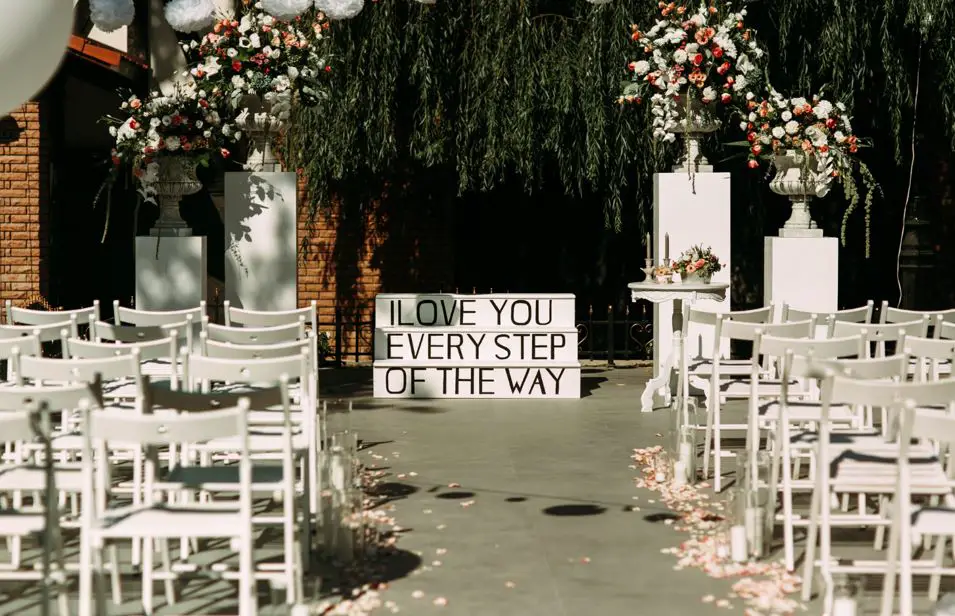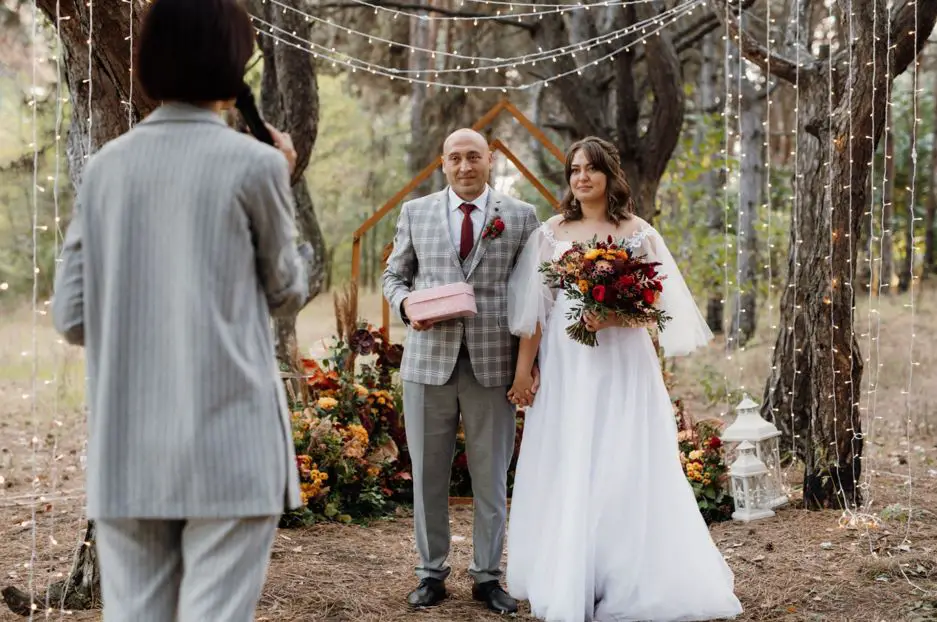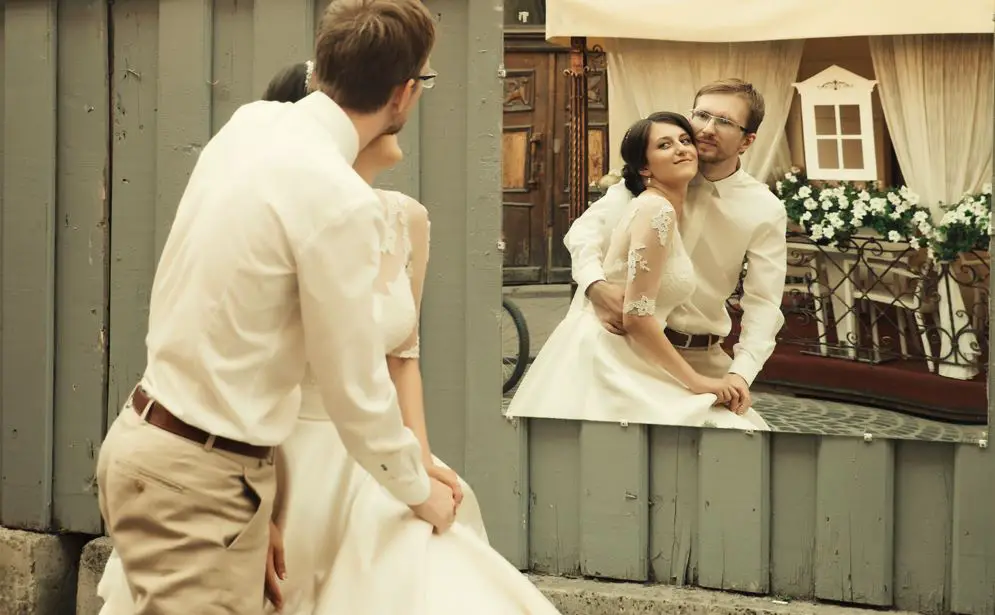Selecting the ideal wedding venue is one of the most important decisions in your planning process.
The venue sets your wedding day's tone, style, and atmosphere, from ballrooms to beachside ceremonies.
This guide explores popular types of wedding venues, the pros and cons of each, and tips for choosing the one that best aligns with your vision, budget, and logistical needs.
Let's get straight to the point
Selecting the perfect wedding venue is essential, as it defines the tone of your entire celebration.
Start by defining your wedding style and theme to match your vision, whether it's a rustic barn, elegant ballroom, or beachside ceremony.
Establish a budget early, as venues can be a major expense, and watch for hidden costs.
Consider your guest list size to ensure the venue can comfortably host everyone.
Plan around the season and date since availability and costs vary; opting for off-peak dates often saves money.
To avoid additional rental expenses, check what services and amenities are included, like tables or chairs.
Prioritise accessibility and guest comfort, especially for remote or destination venues. Always visit the venue in person and review the contract thoroughly to avoid last-minute surprises.
From historic estates to modern urban lofts, the perfect venue will combine style, budget, and logistics to create a stunning backdrop for your day.
1. Identify Your Wedding Style And Theme

A clear wedding style or theme will guide your venue, ensuring the location complements your vision. Whether after a rustic, classic, or modern wedding, pick a venue that aligns with your preferred aesthetic.
- Tip: Make a list of words that describe your ideal wedding—such as “elegant,” “romantic,” or “vintage”—to narrow down venues that fit your style.
2. Set A Budget
Venue and catering costs will likely take up much of your budget. Define a budget range and look for venues that fall within it.
- Tip: Be aware of additional costs, like service fees, parking charges, or rentals for items not included in the venue package.
3. Consider Your Guest List
Finalise an approximate guest list before choosing a venue, as it affects seating arrangements, layout, and venue size.
- Tip: Ensure your guest list matches the venue’s capacity to avoid overcrowding or choosing a space that feels too empty.
4. Select Your Date And Season Carefully
The date and season affect both availability and cost. Like summer weekends, peak season dates are often more expensive and can be booked quickly.
- Tip: Consider off-peak dates to save money and increase your chances of securing the venue of your choice.
5. Evaluate Venue Inclusions And Services
Some venues offer full-service packages, while others require outside vendors. Confirm all included services to avoid unexpected costs.
- Tip: Ask if the venue provides essentials like tables, chairs, and linens or if these items require separate rentals.
6. Think About Guest Accessibility And Comfort
Accessibility and guest comfort should be a priority, particularly for remote venues or destination weddings.
- Tip: If the venue is far from home, consider the accessibility of bathrooms, parking, and accommodation options nearby.
7. Visit The Venue In Person
A venue visit lets you see the layout, ambience, and lighting firsthand, which helps finalise your decision.
- Tip: Visit the venue at the same time your wedding will be held to assess lighting and ambience.
8. Review Venue Policies And Contract Terms
Carefully read the contract for payment terms, cancellation policies, and any restrictions that might impact your plans.
- Tip: Ensure all details discussed are documented in the contract to avoid miscommunication and unexpected fees.
Types Of Wedding Venues

1. Ballroom Or Banquet Hall
Ballrooms and banquet halls provide a timeless and elegant setting, often associated with traditional wedding decor and classic architecture. These venues typically feature grand chandeliers, high ceilings, and polished floors, offering a refined ambience that can elevate the look of any wedding.
Pros
- All-Inclusive Packages: Many ballrooms offer complete packages that cover catering, tables, linens, and decor, making planning easier.
- Weather-Proof: Since ballrooms are indoors, they’re perfect for any season without worrying about rain, wind, or extreme temperatures.
- Spacious Layout: Ballrooms can accommodate large guest lists and spacious seating arrangements, making them suitable for big celebrations.
Cons
- Limited Customisation: Ballrooms often have fixed decor, and some may restrict adding personal touches.
- Higher Cost: These venues tend to be on the pricier side, especially for those that offer luxury packages.
- Potential for Uniformity: Due to their traditional style, ballrooms can sometimes have a formal, “cookie-cutter” feel.
Best For: Traditional weddings, larger guest lists, and couples seeking an all-inclusive venue that handles everything from decor to catering.
2. Garden Or Outdoor Venue
Garden weddings provide a romantic and natural atmosphere. They often take place in parks, private estates, or botanical gardens. The lush surroundings and blooming flowers create a picturesque and tranquil setting.
Pros
- Beautiful Natural Ambiance: The greenery and flowers create a stunning backdrop, often reducing the need for extensive decoration.
- Scenic Photos: Outdoor venues provide a natural setting for breathtaking photos.
- Casual and Relaxed: Gardens are often ideal for smaller, intimate gatherings where guests can enjoy the fresh air and open space.
Cons
- Weather-Dependent: Outdoor weddings require backup plans due to unpredictable weather; tents or indoor alternatives are essential.
- Limited Amenities: Some garden venues need more basic facilities like restrooms, requiring extra rentals or portable restrooms.
- Logistical Challenges: Setting up seating, decorations, and other elements outdoors can be more complex and time-consuming.
Best For: Couples who love nature want a casual, intimate wedding, especially during spring or summer when gardens are in full bloom.
3. Barn Or Farm Venue
Barn and farm venues offer a rustic, charming environment, often surrounded by open landscapes and natural beauty.
This type of venue has become popular for couples seeking a laid-back yet stylish aesthetic.
Pros
- Rustic Appeal: Barns have a distinct rustic charm that complements bohemian, vintage, and countryside themes.
- Spacious Layout: Many barns offer ample space for seating, dancing, and other activities.
- Flexible with Vendors: Barn venues often allow you to bring in your vendors, making customising the event easier.
Cons
- Lack of Amenities: Most barns don’t have heating, cooling, or even restrooms, requiring rentals for guest comfort.
- Higher Setup Costs: These venues often require additional decor, lighting, and furniture rentals, adding to the budget.
- Potential for Extra Work: Setting up in a barn may involve more labour, from arranging tables and lighting to cleaning up after the event.
Best For: Rustic, countryside-themed weddings, DIY-inclined couples, and larger gatherings that require more space and flexibility.
4. Historic Mansion Or Estate
Historic mansions and estates, with their intricate architecture, antique furniture, and lush grounds, offer a touch of elegance and timeless charm. These venues are perfect for couples looking for a luxurious, vintage atmosphere.
Pros
- Elegant Setting: Mansions and estates come with vintage decor and architectural elements, adding sophistication to your wedding.
- Indoor and Outdoor Spaces: Many estates offer both options, allowing for flexible ceremony and reception locations.
- Unique Character: Each historic mansion has its own story, creating a unique backdrop for wedding photos and events.
Cons
- High Rental Fees: Historic sites can be more expensive due to their preservation needs and exclusivity.
- Strict Regulations: These venues often have strict decor and vendor policies to protect their historical integrity.
- Limited Flexibility: Since many are located in heritage-listed buildings, they may limit certain customisations.
Best For: Intimate or mid-sized weddings with a vintage or classic theme and couples who appreciate historical architecture and unique charm.
5. Beach
A beach venue offers a naturally beautiful, serene setting with sandy shores, ocean views, and open skies. A beach wedding can be romantic and casual for couples who love the ocean.
Pros
- Scenic Natural Beauty: The ocean and sunset provide a stunning backdrop for ceremonies and photos.
- Relaxed Atmosphere: Beach weddings are often more laid-back and casual, creating a relaxed vibe for guests.
- Minimal Decor Needed: The natural scenery often eliminates the need for extensive decorations.
Cons
- Weather and Tides: Beaches are highly weather-dependent, and find, sand, and tides can disrupt plans.
- Privacy Issues: Public beaches may have limited privacy with other beachgoers nearby.
- Logistical Challenges: Seating, sound, and accessibility can be more difficult to organise on the sand.
Best For: Smaller, intimate gatherings, sunset or sunrise ceremonies, and couples looking for a casual, seaside celebration.
6. Urban Loft Or Warehouse
Urban lofts and warehouses, with their open layouts, exposed brick walls, and high ceilings, provide a modern, industrial vibe.
This type of venue is popular among couples looking for a contemporary and unique space.
Pros
- Spacious and Open Layout: Lofts are versatile and can be arranged to accommodate large groups or intimate gatherings.
- High Customisation: These spaces are often blank slates, allowing you to add personal touches and decor to create your desired look.
- Unique Urban Aesthetic: The industrial vibe is perfect for modern, minimalist, or urban-themed weddings.
Cons
- Limited Amenities: Many lofts require basic rentals like tables, chairs, and lighting.
- Additional Rentals Needed: Since these venues are often “blank slates,” you may need extra decor, catering setups, and heating or cooling options.
- Noise Restrictions: Urban venues may have noise restrictions, especially in residential areas.
Best For: Modern, minimalist weddings with an urban theme, large groups, and couples who want to design a highly customisable space.
7. Resort Or Destination Venue
Resorts and destination venues are ideal for couples who want to combine their wedding and honeymoon into one event. These venues often provide beautiful views, high-end amenities, and inclusive packages.
Pros
- All-Inclusive Packages: Resorts often offer packages that include catering, decor, accommodations, and event planning, simplifying the planning process.
- Beautiful Surroundings: Resorts are usually set in scenic locations, ideal for photo opportunities and relaxing experiences.
- Guest Accommodations: Resorts provide lodging options that are convenient for out-of-town guests.
Cons
- Higher Cost: Destination venues can be costly, particularly when travel and accommodations are added to the budget.
- Vendor Limitations: Many resorts have strict vendor policies, limiting options for decor or catering.
- Limited Guest Attendance: Not all guests can travel to a destination venue, which may affect your guest list size.
Best For: Destination weddings, multi-day celebrations, couples wanting a luxurious experience, and weddings with smaller guest lists.
Conclusion
Choosing the perfect wedding venue means balancing style, budget, and logistics to bring your vision to life.
Whether you’re drawn to an elegant ballroom, casual beach, or rustic barn, each venue sets a unique tone. Define your wedding style, set a budget, and evaluate guest comfort and venue amenities to make an informed choice.
Visiting the venue and reviewing policies and contracts can help you avoid surprises. The best venue aligns with your theme, comfortably hosts your guests, and creates a memorable backdrop for your day.
FAQs About Weddings
Size. Size encompasses a lot of things, but it's one of the most important factors when selecting a wedding venue is the size of your guest list.
But – and this is a big but – location is arguably even more critical. Why? The answer is simple: people can look their best wherever they go, but locations are fixed. Once you choose a wedding venue, the quality of the surrounding environment dictates how good your photos ultimately end up looking.
While on an average couples book the venue before 6-7 months of the wedding. While some families choose a longer courtship period so that they can give more time to each other and then decide the wedding venue date.
Choosing the perfect venue for your special event is no easy task, and there are a lot of factors to consider. The venue's price, available dates, location, parking availability, accommodations for your guests… the list of things to think about can go on and on and you do not want to make a costly mistake!
The critical thing to remember when selecting a venue location is the logistics. Consider how far your guests will have to travel, including the associated costs: airfare, hotels, transportation, and so forth. That is why events held far away should be reserved for those truly special occasions.

